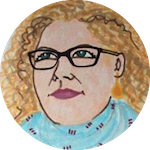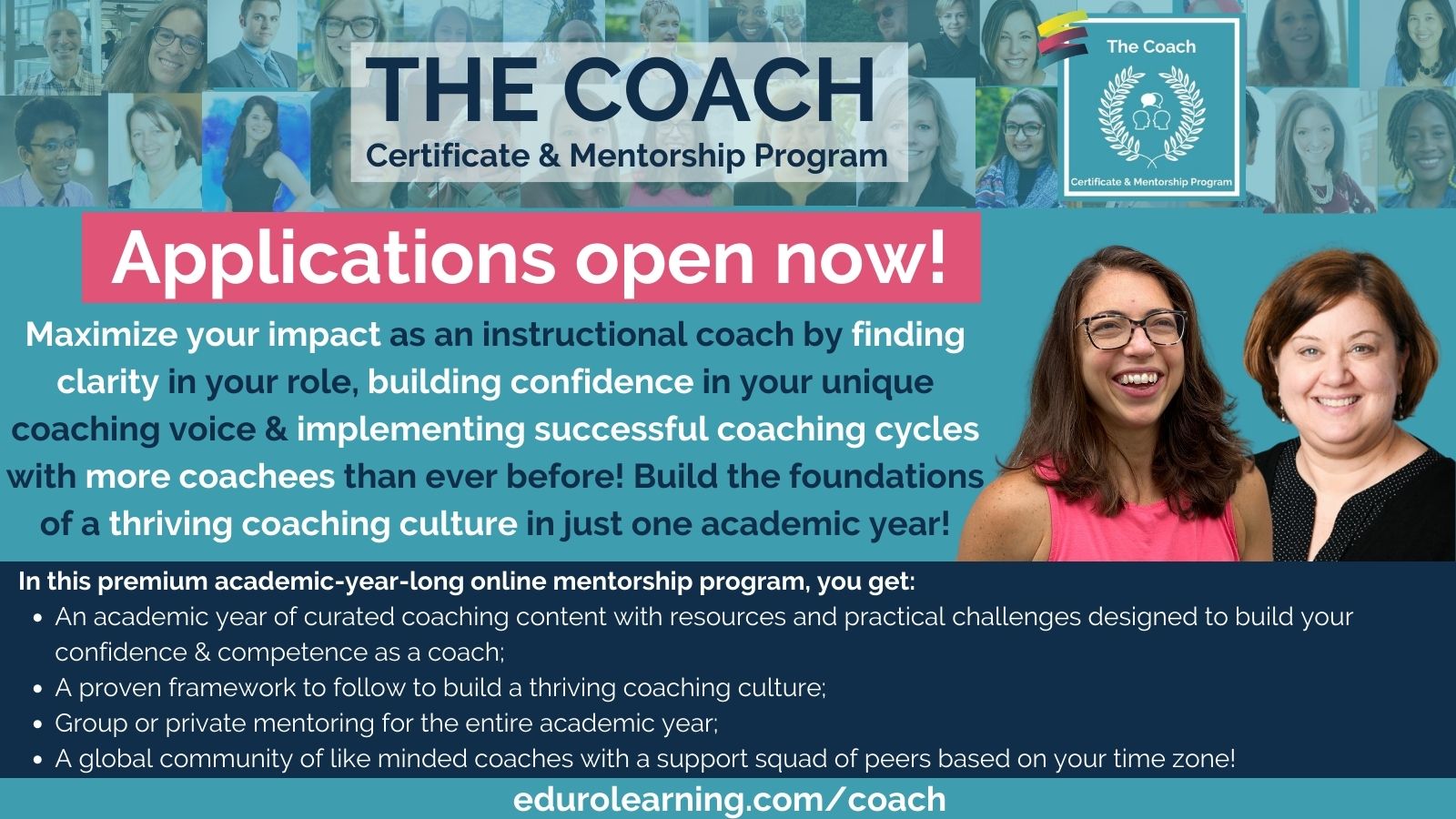On this #coachbetter episode school leader Stacy Stephens explains the way her school decided on a coaching model. Stacy offers insight on ways to define a vision for instructional coaches. She speaks to the importance of taking time and gathering perspectives.
Subscribe to #coachbetter via your favorite Podcast Player!
Featured Guest

Bonus! Watch the Spotlight Version on YouTube!
Show Notes
Four international schools. Director Of Learning and Strategic Planning at ISBeijing. AES New Delhi, Lincoln School Buenos Aires. Starting AIS Kuwait.
Tell us about the work you’re doing at ISB around coaching.
Incremental in our approach around coaching. Wary of taking positions and repurposing them without genuinely changing the position and changing the work. 5 years ago, had an enormous amount of curriculum work to do. Needed people to be focused on building programs. Have gone through a curriculum revision process.
How do we dig deep tracks around this work? Can’t constantly follow the same process to on board people. How do we support more in the implementation process?
First coach hired in 2017-2018 for 2018 – 2019 school year: ES Math Coach to support Math curriculum work.
Started with a PK-12 team of teachers interested in being part of the conversation about coaching. Had 40 people interested, but only had 20 on the team.
Started by laying out a mission and doing research. Created a mission and values first.
How did the decision to start coaching come about?
We have clear understanding about where we are tight and where are loose. Stage 1 and Stage 2 in UbD are tighter, instructional stages (Stage 3 and beyond) is loose. Teachers had support from the curriculum office for program development, but now need instructional support at that Stage 3 level.
Important not to trade program development for instructional support. Add a position rather than take away someone from Curriculum office. Just because we can hire coaches, doesn’t mean we should. Be clear around roles.
Math coach is 80% coaching, 20% curriculum work.
What’s the aim and goal of the role?
Looked at a variety of models, started eliminating things & focusing on things. Cognitive coaching is not the model, but it gives us the skills to employ in another model. Student Centered Coaching & Instructional Coaching with Steve Barkley and Jim Knight. Met once a week for an hour. Decision: Student Centered Coaching. Believe in cycles. Coaching heavy vs coaching light. Collecting data. Assessing and looking for impact. Continuous growth process.
All principals were part of the original K12 group. Helped to lay foundation and direction. Smaller team. All School based leaders were part of regular processing meetings. Talked about it 3-4 times with this group over the last year. Doesn’t belong to any one person, belongs to the community that worked on this process.
Math coach is helping bring clarity.
Coaching at ISB
strives to create a culture of learning through collaborative partnerships that serve to empower teachers and improve student learning.
Mission: Coaching at ISB strives to create a culture of learning through collaborative partnerships that strives to empower learning and
| We value | |
| A Culture of Learning | Nurturing, celebrating and developing all learners. |
| Collaborative Partnerships | Based on trust and respect and working toward shared understanding of goals for student learning. |
| Reflective Practices | Integral to a continuous growth mindset. |
| Empowerment of Teachers | Building agency around professional practice and growth. |
| Evidence-based Decisions | Sound evidence used collaboratively to improve student learning and teacher practice. |
Why are school leaders so on board with this?
A very-process oriented school. This is an opportunity for us to live our values. This has been a time to “think slow”. Part of it is timing. We knew 2 years ago that we needed a coach. Easy because the principals were learning alongside the team.
Stacy has 2-3 hours once a month with all Learning Leaders to discuss school needs. Data proves the impact of coaching. Data shows you’re not going to have an impact unless you plan it. Connected with other coaches and could learn from their mistakes. Had the luxury and the time of going slower.
Conversation started with the research from coaching, and the school’s own data. Using the accreditation report and self-study. Recognition from both internal and external analysis of data. Including data about turnover and costs on developing programs. Made with a group of 20 people.
Where are you at now?
One coach this year. Based on data, have added an additional coach in ES for next year: K2: Literacy, Reading Recovery and Phonics. These are areas where we have inconsistent understanding / implementation at this time. This is very targeted so we can see the impact of this.
Aim: in another year or so, adding coaches to the secondary. Banded coaching in the ES to up that support.
Goal: switch from invitational style coaching, to “coaching is a part of what we do here at ISB, you will have an opportunity to work with a coach on a coaching cycle this year”
What kinds of data are you going to collect to “prove” the success of coaching in ES?
Student-centered coaching is data driven. Focuses on collection data from student learning targets, and assessment. Can we collect things about asking questions, or other types of data. Start with the data, identify data, use the data, plan interventions, compare data. Need to be robust / more expansive in how we define data. Data is a tool.
School has data agreements and philosophies.
Could be a great opportunity to see how coaching impacts teacher growth and mindset about learning and collaborating. Using learning walks to collect data. Plan interventions to improve, going through coaching cycles. Working on improvement over time. Can look at program improvement, not just teacher practice.
What would you say is the one key aspect of this process?
Knowing your needs and hone in on what you’re trying to accomplish. Not coaching for coaching’s sake. People are repurposing their jobs from within because they feel the title is more “valuable”. Defining what are we coaching towards. If your job doesn’t coach towards that, then your job title is not going to change. Titles communicate who you are and what you’re doing in our organization, so we need to be clear.
How did you communicate the coaching role to the ES?
Coaching shared mission and values with teachers early in the year. 36 new teachers in ES. Really busy supporting new teachers. Will see how it works better next year with only 12 new teachers. This is “year zero”. Next year is “year 1”
If we add additional positions, those will be posted. Strong shot for internal candidates because they know the school so well.
Roadmap worked really well for ISB, may not work everywhere. Going so slow is going to ensure the best possible outcome. Having someone as Curriculum Director as part of this conversation was critical. Could have been really easy for the middle level of leadership (leading from within) to not be able to get so far. There are some key things we need to leverage for success, understanding bigger school-wide vision and goals – this gives us something to coach around. Need to be really strategic in picking the things to leverage in the process.
Level Up Your Coaching with The Coach!
If you are ready to dive deep into your coaching practice, to help you #coachbetter and build a thriving coaching culture in your school, please join us for our next cohort of The Coach!
Wherever you are in building a coaching culture in your school, The Coach will give you the strategies, skills and tools you need to make coaching a success and will empower you to confidently apply instructional coaching strategies in any situation – from building a coaching program, to having coaching conversations, to being a leader in your school community. We facilitate only one cohort each academic year so we can offer individualized support for each participant.
Coaches of all levels are welcome: you’ll start the program with a self-assessment to determine exactly what the next steps are for you!
Registration for our next global cohort opens once a year – check the website for details!






Recent Comments